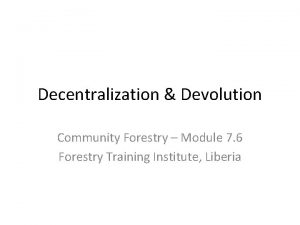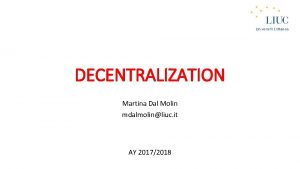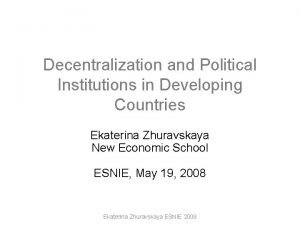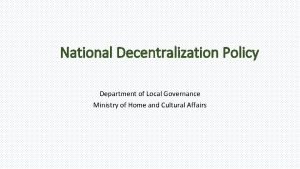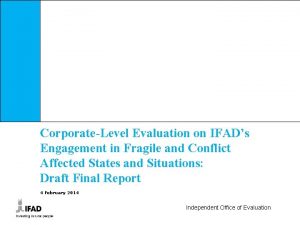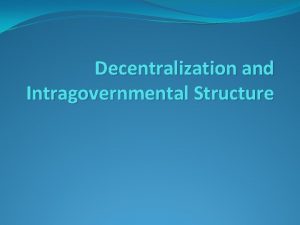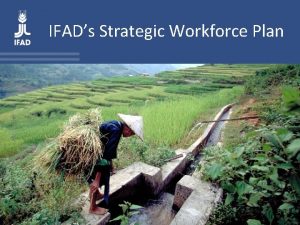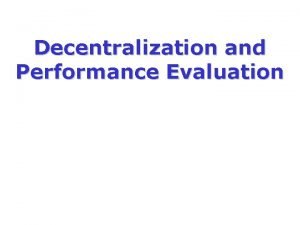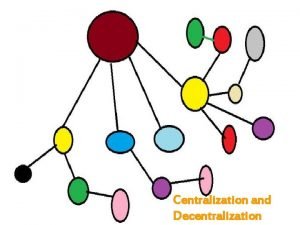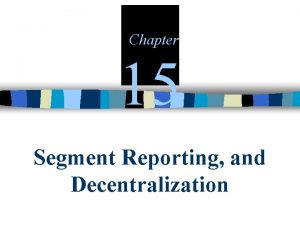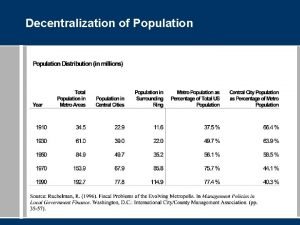Corporatelevel Evaluation of IFADs Decentralization Experience ECG Meeting











- Slides: 11

Corporate-level Evaluation of IFAD’s Decentralization Experience ECG Meeting, London, 1 -2 December 2016

IFAD’s decentralization journey Key milestones 2003 Field Presence Pilot Programme (FPPP). Evaluated in 2007 Activity plan for IFAD’s country presence 2011 IFAD Country Presence Policy and Strategy 2013 IFAD Country Presence Strategy (2014 -2015) 2016 IFAD Corporate Plan for Decentralization - December Current situation 40 country offices (39 oper. in mid-2016), cover 78% IFAD’s ongoing financing 2

Country Presence at IFAD Configurations 1. Absence of country office 2. Country office led by a national officer 3. Country office led by an out-posted international staff member 4. Sub-regional hub supporting multiple countries 5. Regional Office (Nairobi) 3

4

Evaluation objectives and criteria To evaluate IFAD’s decentralization experience and efforts, including the underlying assumptions Relevance To evaluate the contribution of IFAD’s decentralization for better operational performance and development results Effectiveness To evaluate the costs of the decentralization process in relation to the results achieved Efficiency 5

Evaluation Methodology • Formative and summative evaluation • Mixed methods for data collection: IFAD’s available quantitative data Electronic survey (1, 200 respondents) 13 Country case studies Key informant interviews Documents review 4 Regional workshops Findings & Comparator organizations Recommendations 6

Evaluation Methodology - 2 • Elaborated a “results chain” • Quantitative analysis: test of significance of differences: (i) with vs. without country office; (ii) before vs. after country office Ø Indicators of project performance Ø Indicators of development results Ø Caveat: concomitant factors • Triangulated with other sources of evidence • Comparisons between country presence modalities 7

Findings - Relevance v Objectives for the decentralization process were overall valid v Some assumptions not realistic: − Cost neutrality and “light touch” approach vs. broad range of expectations for country offices − Leeway to experimenting country presence but little analysis of needs, costs and performance − Initially, focus on country presence but less attention to reorganizing headquarters 8

Findings - Effectiveness 1. Operational effectiveness: − Better strategy and project design (country context) − Enhanced IFAD implementation support (problem solving) 2. Development results. Significant rating differences (with/without) − Impact on: (i) household’s income, assets; (ii) food security − Gender equality − Sustainability of benefits 3. Mixed contribution to non-lending activities − Stronger partnerships with Governments and donors; but uneven effects on knowledge management and policy dialogue − Limited resources and varying interest and experience of staff 9

Findings - Efficiency v Difficult to reconstruct costs of decentralization due to accounting system v IFAD managed to contain costs associated with country presence Ø However, not all cost reducing options pursued. E. g. , readjustment of HQ staffing (same as in 2008) Ø Strategic and cost-efficiency advantages of sub-regional hubs not fully brought to bear v A number of organizational issues. E. g. Ø Delegation of authority Ø Orientation and training, career opportunities for national staff 10

Key recommendations 1. Consolidate country presence and enhance cost-efficiency § In the field: build “critical mass” upon advantages of sub-regional hubs § Re-organize staff between headquarters and country offices, based on functional analysis exercise 2. Non-lending activities. Differentiate expectations by type of country office. Establish dedicated budget line in country offices 3. Enhance delegation of authority: budget holding, communication 4. Enhance staff incentives and capacity to operate in a decentralized environment 5. Improve the quality of data, monitoring and self-assessment 11
 Advanced cost and management accounting ppt
Advanced cost and management accounting ppt Decentralization
Decentralization Advantages of decentralization
Advantages of decentralization Decentralization accounting
Decentralization accounting Centralization vs decentralization
Centralization vs decentralization Segment reporting and decentralization
Segment reporting and decentralization Decentralization
Decentralization Decentralization
Decentralization Decentralization
Decentralization Decentralization policy
Decentralization policy Early experience vs. later experience
Early experience vs. later experience Indirect experience examples
Indirect experience examples






